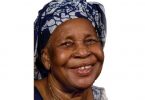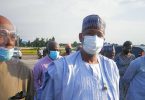Since September 22, when it was discovered that a rare disease known as Monkey Pox has shown its ugly head in Nigeria, the social media and even the main stream media has been abuzz with frightening photographs of victims. With large pox all over their body, it leaves many Nigerians wondering whether, indeed, the end has come.
Ekiti State Governor, Ayodele Fayose, added a comic relief while speaking with Newsmen in Ado Ekiti last week, deliberately put his hands in his pocket and when greeted by reporters, refused to shake hands with them.
Shocked by the attitude of the Governor, some of the pen professionals asked the Oshokomale 1 of Ekiti why the sudden change in his usual practice and he blamed his action on the outbreak of Monkey pox in the country.
Nobody could blame Fayose for his action. What is however sure is that the sudden appearance of the disease has sent jitters down the spine of many Nigerians. Medically, it should not be so. Monkey pox is a mild disease, far less fatal than its sisters-Small pox or Chicken pox.
Since its appearance on September 22, when the Nigeria Centre for Disease Control (NCDC) was notified of its existence in Bayelsa State and with report that it has spread to seven states in the country, not a single death has been recorded from the disease.
According to figures made available by the NCDC, a total of 35 cases have been reported in Bayelsa, Rivers, Ekiti, Akwa Ibom, Lagos, Ogun and Cross Rivers States.
CONFIRMATION
As at Thursday when this article was put together, not a single case has been confirmed out of the 35 suspected cases and this is due to that fact that the World Health Organisation (WHO) has laid down stringent measures that must be followed to the letter before it can confirm or deny the existence of Monkey pox in a country.
Although the NCDC has obtained series of blood samples of some of the suspected victims of the disease and the first layer of test done in Nigeria, another test must be done at a world class laboratory in Senegal. Mo
Many of the initial test results have been sent to Senagal and results are still been awaited. Indeed, a total of 17 samples have been received by the NCDC at the coordinating Laboratory. It has however not yet gotten any confirmatory result so far.
WHAT HAS BEEN DONE SO FAR
Since the outbreak of the disease in September 22, the NCDC, which is an arm of the Federal Ministry of Health, has activated an emergency response centre to coordinate its response across the affected states.
Aside that, national RRSTs have been deployed and continue to provide onsite support to Bayelsa State, while off site support is also being provided to other states through the Emergency Operation Centre.
The Federal Ministry of Health, through the Risk Communication activities, heightened to advice the public on preventive measures.
The Ministry is also briefing political leaders, especially state governors, on what should be done to prevent the spread of the disease while all the states of the federation, including the Federal Capital Territory, have been formally notified to be on red alert.
SIGNS AND SYMTONS
The NCDC has adviced Nigerians with any of these following symptoms to visit the nearest government hospital for proper diagnose of Monkey Pox: fever, headache, body pains, enlargement of the glands, sore throat as well as the characteristic generalised vascular rash which might last between two to four weeks.
Money pox is self limiting; which means patients tend to recover with time. Indeed, seven of the first set of victims reported in Bayelsa have fully recovered.
In order to prevent further spread of the disease, Nigerians have been advised to shun bush meat for now, as it is mostly transmitted through contact with infected animals, human or contaminated materials.
BASIC MEASURES ON HOW TO PREVENT MONKEY POX
These are measures that could be used to prevent the spread of monkey pox from spreading:
*Avoid self medication.
*Frequent hand washing with soap and water.
*Report any suspected case to the nearest health facility or NCDC on a toll free line 080970000-10. NCDC is also on twitter and facebook @NCDCgov
*Keep your environment clean.
In view of the fact that some health workers have also been infected while taking care of the sick, they have also been advised to practice standard precautionary measures at all times, use personal protective equipment when attending to infected persons while suspected cases should be managed in an isolation ward.
They have also been charged to avoid unethical use of patients’ photographs on social media.
APPEAL TO THE MEDIA
Monkey pox is a rare viral zoonotic disease with symptom in humans similar to those seen in small pox patients, but much less severe and with low fatality rate. As at Thursday October 12, not a single death has been recorded.
It is therefore surprising that the disease is been treated on the social media on such an alarming scale. Generous usage of pictures of victims is really unethical and could lead to stigmatisation.
Medical practitioners are also fully on ground to render services to those who might be infected.
The fear that the phenomenon has created in the minds of millions of Nigeria is needless and its high time we stopped the trend. This is better for us as a nation.
Akintunde is the Special Assistant, Communication and Strategy to the Minister of Health.







Leave a Comment
You must be logged in to post a comment.